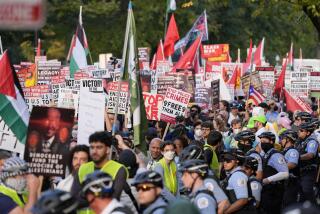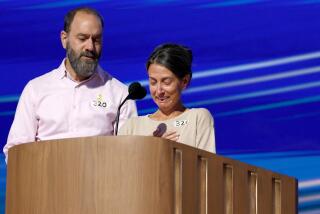Op-Ed: 50 years after the ’68 Democratic National Convention protests, ‘the whole world is watching’ again
We were standing opposite a line of National Guardsmen. We were unarmed; they had M1 Garand rifles and sheathed bayonets. We were teenagers who’d met at a Liberal Religious Youth camp in New Mexico, seven among 10,000 protesters at the Democratic National Convention in Chicago in August 1968. They were 20 among an estimated 12,000 troops and 12,000 police sent there to stop us. It’s amazing none of us were killed.
For three nights and two days, police and protesters had been skirmishing all over town. On Wednesday — when Hubert Humphrey was scheduled to be nominated for president — we were in Grant Park, at the one permitted rally of the week. The police attacked early. I saw Rennie Davis, one of the leaders of the National Mobilization Committee to End the War in Vietnam, bleeding crimson from a scalp wound. I heard Phil Ochs sing “The War Is Over.” “Just before the end, even treason might be worth a try” got a cheer. He got a standing ovation with his next line: “This country is too young to die.”
When protest organizer Tom Hayden told us to form into affinity groups and fight like guerrilla warriors, we applauded politely. But when nonviolent activist David Dellinger told us to march out of the park toward the International Amphitheatre, where the delegates were meeting, we headed out peacefully.
As in 1933, when Hitler was elected in Germany, 1968 was a historic juncture. Now 2018 is shaping up to be another.
The guardsmen in our path had their names stitched above their uniform shirt pockets. “Red Rover, Red Rover,” we chanted, just like at our LRY retreats, “send Sgt. O’Reilly over.” The troops slipped on their gas masks and fired tear gas canisters at our feet.
Choking, we moved north; volunteer paramedics gave us damp cloths to breathe through. At Jackson Street, a bridge to Michigan Avenue was open. We swarmed west across it, joining the Southern Christian Leadership’s Poor Peoples Campaign — a mule train — heading south.
We only got about five blocks. Lines of baby-blue helmeted Chicago police stopped us in front of the Hilton Hotel, where the convention delegates were staying. There was an ABC camera truck on the street, and the refrain started: “The whole world is watching! The whole world is watching!” It felt like at least a symbolic victory that we’d made it that far.
After a few minutes, we could see the cops guiding the mule train through their lines. It was just four months after Martin Luther King Jr.’s assassination and Chicago Mayor Richard Daley wasn’t taking any chances of provoking more riots in the city’s black ghettos.
Everyone else was boxed in. My friends and I were squeezed between a police van on the park side of the avenue, and the front of the hotel. Then pop, pop, pop — more tear gas canisters landed, and the police charged. I heard glass shattering and saw the window of the Haymarket Lounge, the hotel bar on the street, give way as protesters were pushed through, followed by club-swinging cops.
We retreated back up Michigan Avenue. A short time later, two of us rounded a corner near the Hilton and ran into a long-haired guy in his 20s who half-whispered: “Walk away calmly.”
“Don’t walk, run,” a louder voice called out. I recognized author Norman Mailer with a drink in one hand and his arm around a blond in a cocktail dress.
Overturned garbage cans, mounds of smoldering trash, and protesters and delegates filled the street. A cop grabbed me and my friend and dragged us over to the burning trash. He held his baton over us, hand shaking, until we started moving the garbage onto the sidewalk.
A priest said, “Officer, these boys weren’t the ones who…”
The cop swore at him, turned and kicked a soda can that hit a convention delegate in the chest.
“Watch it, buddy,” the guy said, just before the cop got his club around his neck, pulling him off his feet.
A black officer jerked his thumb at me. “Get outta here,” he said.
When we got back to the suburb where we were staying, the convention coverage was still playing on TV. By then, Connecticut Sen. Abraham Ribicoff had already denounced the “Gestapo tactics on the streets of Chicago” from the podium. When the TV cameras cut to Daley, what lip readers later claimed he said can’t be printed in this newspaper.
The next morning, back downtown, Armored Personnel Carriers were rumbling past me on the streets. It was the last day of the convention and I called home from a phone booth. My mother had no idea I’d come to Chicago instead of getting on the camp bus back to New York. I was ordered home immediately. She was so angry she wouldn’t talk to me for a week. By the time I saw my dad (they were separated), he’d calmed down, but only because he’d already taken his turn shouting at me by phone.
I was too young to understand how deeply worried my parents were during that summer of riots, protests and rebellion. Both of them were refugees from pogroms and the Holocaust, and they would have preferred their 17-year-old son to stay safely out of it.
Instead, a few weeks later, I was back in the streets, protesting at a campaign rally at Madison Square Garden for former Alabama Gov. George Wallace, who was running for president as an openly racist third-party candidate. It was another wild scene: charging police horses, trash fires and thousands of demonstrators and cops. When I confronted my mother’s worried fury that time, I spoke thoughtlessly. In the 1930s, I said, if young people had gone into the streets of Germany, maybe Hitler wouldn’t have come to power.
Seven years later, when my mother was in the hospital after surgery for lung cancer and she knew she was dying, she reminded me of that night, and how I’d hurt her to the bone. “I was only 9. There was nothing I could do,” she said through tears.
Enter the Fray: First takes on the news of the minute from L.A. Times Opinion »
From an early age, I’ve known enough of my family history to get that the comforts and security of our lives are tenuous, that at any moment, history can kick the supports out from under you. Despite my parents’ fears, Chicago added a different lesson: If there is something you can do, do it.
I believed then that the tear gas and blunt force trauma of the “police riot” in Chicago could contribute to the end of the Vietnam War. I believe now that it did that and more, adding to the expansion of civil and human rights in this country and, ultimately, to the restoration of the rule of law, when President Nixon resigned six years later to the month.
As in 1933, when Hitler was elected in Germany, 1968 was a historic juncture. Now 2018 is shaping up to be another. The country that was too young to die 50 years ago is under threat again. While we can, we must become active players in determining our common future. And once again, the whole world is watching.
David Helvarg is executive director of Blue Frontier, an ocean conservation and policy group. He chaired the global March for the Ocean on June 9.
Follow the Opinion section on Twitter @latimesopinion and Facebook.
More to Read
A cure for the common opinion
Get thought-provoking perspectives with our weekly newsletter.
You may occasionally receive promotional content from the Los Angeles Times.










